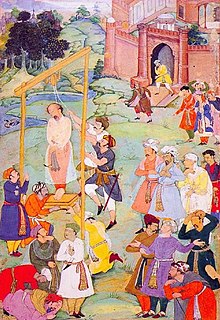A Quote by Abdelkader El Djezairi
The pleasure and the love of God for His creatures constitute the original state. His pleasure and love are the means by which He has brought His creatures into existence and are the cause of that bringing into existence. He who knows that he possesses neither being nor act rediscovers himself in that original state of pleasure and divine love.
Related Quotes
To admit the existence of a need in God is to admit incompleteness in the divine Being. Need is a creature-word and cannot be spoken of the Creator. God has a voluntary relationg to everything He has made, but He has no Necessary relation to anything outside of Himself. His interest in His creatures arises from His sovereign good pleasure, not from any need those creatures can supply nor from any completeness they can dring to Him who is complete in himself.
Since love of God is the highest felicity and happiness of man, his final end and the aim of all his actions, it follows that he alone observes the divine law who is concerned to love God not from fear of punishment nor love of something else, such as pleasure, fame, ect., but from the single fact that he knows God, or that he knows that the knowledge and love of God is the highest good
Love is in the pleasure of possession, but in the Love of Allah there is no pleasure of possession, because the stations of the Reality are wonderment, the cancelling of the debt which is owed, and the blinding of vision. The Love of the human being for God is a reverence which penetrates the very depths of his being, and which is not permitted to be given except to Allah alone. The Love of Allah for the human being is that He Himself gives proof of Himself, not revealing Himself to anything that is not He.
He knew that all things human are transitory and therefore that it must cease one day or another. He looked forward to that day with eager longing. Love was like a parasite in his heart, nourishing a hateful existence on his life's blood; it absorbed his existence so intensely that he could take pleasure in nothing else.
You asked for a loving God: you have one... The consuming fire Himself, the Love that made the worlds, persistent as the artist's love for his work and despotic as a man's love for a dog, provident and venerable as a father's love for a child, jealous, inexorable, exacting as love between the sexes. How this should be, I do not know: it passes reason to explain why any creatures, not to say creatures such as we, should have a value so prodigious in their Creator's eyes.
How is it that we do not die of love in seeing that God Himself could do no more than shed His divine blood for us drop by drop? When as man He was preparing for death, He made Himself our food in order to give us life. God becomes food, bread for his creatures. Is this not enough to make us die of love?
The problem of reconciling human suffering with the existence of a God who loves, is only insoluble so long as we attach a trivial meaning to the word "love", and look on things as if man were the centre of them. Man is not the centre. God does not exist for the sake of man. Man does not exist for his own sake. "Thou hast created all things, and for thy pleasure they are and were created." We were made not primarily that we may love God (though we were made for that too) but that God may love us, that we may become objects in which the divine love may rest "well pleased".
In his extreme youth Stoner had thought of love as an absolute state of being to which, if one were lucky, one might find access; in his maturity he had decided it was the heaven of a false religion, toward which one ought to gaze with an amused disbelief, a gently familiar contempt, and an embarrassed nostalgia. Now in his middle age he began to know that it was neither a state of grace nor an illusion; he saw it as a human act of becoming, a condition that was invented and modified moment by moment and day by day, by the will and the intelligence and the heart.
You, methinks you think you love me well;
For me, I love you somewhat; rest: and Love
Should have some rest and pleasure in himself,
Not ever be too curious for a boon,
Too prurient for a proof against the grain
Of him ye say ye love: but Fame with men,
Being but ampler means to serve mankind,
Should have small rest or pleasure in herself,
But work as vassal to the larger love,
That dwarfs the petty love of one to one.
The existence of pleasure is the first mystery. The existence of pain has prompted far more philosophical speculation. Pleasure and pain need to be considered together; they are inseparable. Yet the space filled by each is perhaps different. Pleasure, defined as a sense of gratification, is essential for nature
Man... is an inextricable tangle of culture and biology. And not being simple, he is not simply good; he has... a kind of hell within him from which rise everlastingly the impulses which threaten his civilization. He has the faculty of imagining for himself more in the way of pleasure and satisfaction than he can possibly achieve. Everything that he gains he pays for in more than equal coin; compromise and the compounding with defeat constitute his best way of getting through the world. His best qualities are the result of a struggle whose outcome is tragic. Yet he is a creature of love.
God's love is so perfect that He lovingly requires us to obey His commandments because He knows that only through obedience to His laws can we become perfect, as He is. For this reason, God's anger and His wrath are not a contradiction of His love but an evidence of His love. Every parent knows that you can love a child totally and completely while still being creatively angry and disappointed at that child's self-defeating behavior.








































